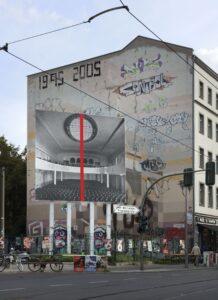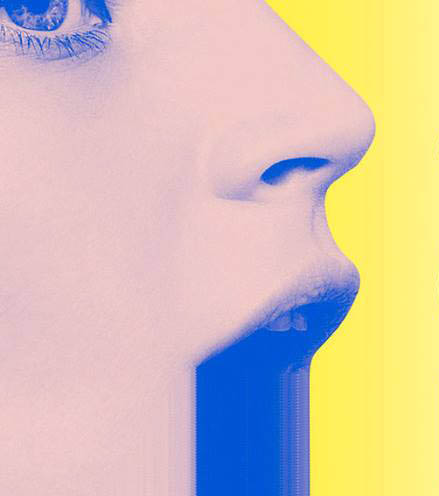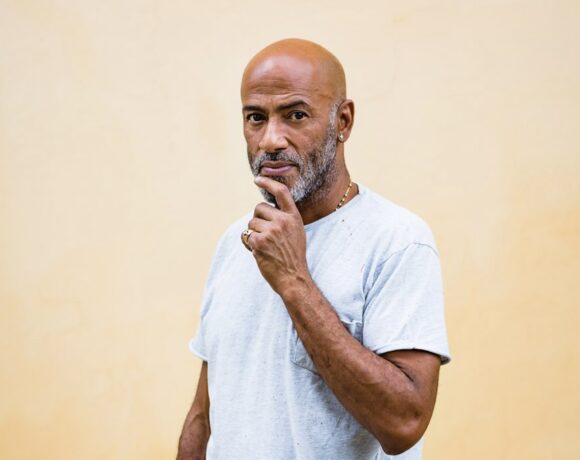Gülsün Karamustafa is a visual artist and filmmaker who explores socio-political issues and tackles themes that are uncomfortable and sometimes unpopular with hierarchical and male-dominated power, such as sexuality-gender, exile-ethnicity and displacement-migration. Her work is spread across a variety of different media, using various techniques and methods, including installation, ready-mades, photography and video. “Acclaimed as one of Turkey’s most influential contemporary artists”, her work also reflects on the traumatic effects of Turkish nation-building, as it responds to the processes of modernization, political turbulence and civil rights in a period including military coups from 1960, 1971 and 1980.

Gülsün Karamustafa, Irreversible Remnants, 2022, installation view intersection of Friedrichstraße / Torstraße, in walking distance from Neuer Berliner Kunstverein (n.b.k.) © Photo: n.b.k. / Jens Ziehe
Karamustafa was born in Ankara, Turkey in 1946, lives in Istanbul. Between 1958 and 1963 she attended high school at Ankara College, and then graduated from the Academy of Fine Arts, Istanbul, Department of Painting in 1969, in the school of Bedri Rahmi Eyüboğlu. In those years she experienced the student revolts, becoming familiar with political practice and above all a civic awareness. After graduating she spent a year in London, but on her return to Istanbul in 1971 she was convicted of aiding and abetting a political fugitive and had her passport revoked for sixteen years.

Screening in the framework of the n.b.k. Billboard project Gülsün Karamustafa. Irreversible Remnants: Die Suffragette, 1913, silent film with Asta Nielsen, 1h, loop (directed by Urban Gad, reconstructed version from 2009, courtesy: Deutsche Kinemathek – Museum für Film und Fernsehen) © Photo: n.b.k. / Jens Ziehe
The artist declares: “My relationship with art did not develop for personal satisfaction or for the need to glorify what I do. I carry the artistic burden as a heavy mission from the beginning, thinking that I have to produce something significant”. This significant aspect starts from her life, to then spread to her whole country, to the problems of her country, in the sense that her experiences and her vicissitudes become an example or model of an analysis that is not only aesthetic but even a complaint. For example, in retrospect, the author explored the year of her arrest in a work entitled The Stage (1998) in which she presented a photo taken in the courtroom, while the time spent in prison was documented in the Prison Paintings series from 1972, first exhibited in her 2013 solo show (A Promised Exhibition) at SALT in Istanbul.

Gülsün Karamustafa, The Monument and the Child, 2011, courtesy of the Artist
Now, one of her public art projects is visible in Berlin until February 26th. This intervention, curated by Lidiya Anastasova, is part of the Billboard project, supported by n.b.k., and is located at the intersection of Friedrichstrasse and Torstrasse, a two-minute walk from the Neuer Berliner Kunstverein, inserted in a central and very busy urban environment. Every six months, works by international contemporary artists were presented here, specially conceived for the large format surface, which invite visitors and passers-by to confront the aesthetic and social implications of contemporary art and the urban environment. A way to involve those who don’t cross the door of a museum or who perhaps have no knowledge of what is exhibited inside it. In this work, in particular, the author proposes the interior of a cinema (when the cinemas were still crowded and the seats were divided between the balcony and the stalls): the image (which historically refers to the first theaters from the early twentieth century) is transversally cut by a red band, as if to indicate the denial of the right to speak and to listen, thus evoking the substantial problems of the relationship between freedom of expression and power constituted in the master sense.

Gülsün Karamustafa. Irreversible Remnants, 2022, installation view intersection of Friedrichstraße / Torstraße, as seen from Neuer Berliner Kunstverein (n.b.k.) © Photo: n.b.k. / Christian Vagt
But the work does not end with the poster: in the n.b.k. you can attend the screening of an emblematic film “Die Suffragette” (1913, directed by Urban Gad), starring the famous actress Asta Nielsen. In conclusion, it should be added that in 2015 a film was made that recalls those stormy years of struggle for women’s right to vote (but behind it there were the rights to education, property, inheritance…), directed by Sarah Gavron, with UK production, title “Suffragette”. But let’s think of the scandal of this theme in a 1913 film! The controversial film was shown in its entirety in cinemas in Berlin, but in Catholic Bavaria it was heavily censored, so much so that the director did not allow it to be shown. In some way, this installation, in addition to focusing on a theme that may seem outdated to Westerners (freedom of thought and action and women’s civil rights), actually makes us understand transparently that there is another world (just think to Afghanistan, Iran and so on) where this wound is still open and bleeding.

Screening in the framework of the n.b.k. Billboard project Gülsün Karamustafa. Irreversible Remnants: Die Suffragette, 1913, silent film with Asta Nielsen, 1h, loop (directed by Urban Gad, reconstructed version from 2009, courtesy: Deutsche Kinemathek – Museum für Film und Fernsehen) © Photo: n.b.k. / Christian Vagt
Works by Karamustafa are present in public and private collections; among others, Tate Modern, London; Guggenheim, New York; Museum of Contemporary Art, Chicago; Musée d’Art Moderne de la Ville de Paris; MUMOK, Vienna; Sammlung Essl, Klosterneuburg; and Van Abbemuseum, Eindhoven.
Fabio Fabris
Info:
Gülsün Karamustafa. Irreversible Remnants
until 26/02/2023
n.b.k. Billboard
nbk.org/de

is a contemporary art magazine since 1980






NO COMMENT